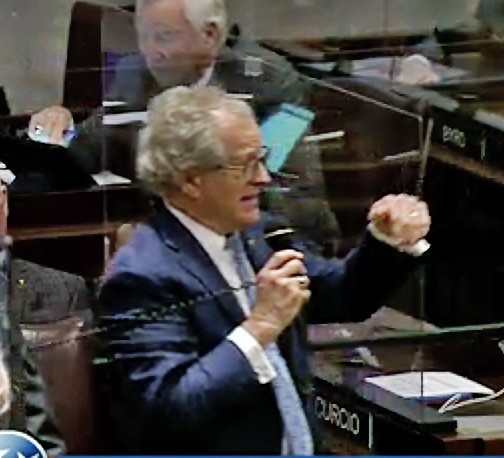UPDATE: Reportedly, the House-Senate conference committee has agreed on new amounts for Memphis and Shelby County, as well as for Davidson County (Nashville). Memphis and Nashville are to receive $10 million apiece as a result of negotiations by the conference committee, which included three participants from Davidson County but none from Shelby County.
Locally, this solution represents a partial restoration of the $14.3 million originally allowed to Memphis by the state Senate but reduced to $5 million in the proposed House version of the budget. Shelby County’s amount reverted to the Senate’s original budget version of $7.7 million, a figure which had also been reduced to $5 million in the proposed House budget.
The funding is part of a $200-million package which was authorized by the legislature for statewide distribution in March as a response to the economic emergencies caused via the onset of the COVID-19 pandemic. At that time, the money was restricted for specific infrastructure or COVID-related purposes, but the restrictions were lifted by the Senate last Thursday and by the House on Wednesday of this week, but the two chambers disagreed on the amounts to be allotted to the state’s two largest urban areas.
Accordingly, the money, whose sums the two legislative chambers now agree on, is available for the general funds of both Memphis and Shelby County. 
Rep. Mark White
PREVIOUSLY REPORTED: What the Senate giveth, the House taketh away. The newly freed state financial resources that the Tennessee Senate voted last week to make available to Memphis and Shelby County have been truncated significantly by the House, and only the work of a joint-chamber conference committee can fully restore them. The issue is that of so far unreconciled differences in the budgets approved by each chamber.
On Thursday of last week, state Senate majority leader Jack Johnson (R-Franklin) announced that the Senate’s version of the fiscal 2020-21 budget would allow the lifting of restrictions from a $200 million infrastructure grant program approved in March. In practical terms, what this meant was that the City of Memphis was enabled by the Senate action to re-allocate some $14.3 million in previously restricted infrastructure-grant funds for any purpose it chose; Shelby County’s share of the newly freed-up funds was $7.7 million.
The problem is that the House version of the state budget, passed on Wednesday, allows the lifting of restrictions on how that previous statewide funding is spent by local governments but caps the amount allowed for the cities of Memphis and Nashville and for Shelby County to a maximum of $5 million each. That’s a cut of $9.3 million for Memphis, and one of $2.2 million for Shelby County. The theory of the reductions on the amounts for the state’s two largest urban centers, as presented by House majority leader William Lamberth (R-Portland), is based on the state’s need for fiscal austerity and the fact that Memphis, Nashville, and Shelby County, uniquely, had all been beneficiaries of the federal CARES Act, covering some of the same potential purposes, including COVID-19 needs, as were intended for the state infrastructure-grant money in March.
This has not gone down well with Shelby County’s legislative delegation in Nashville, nor with the two local governments here. “This does not seem so good a deal for Memphis and Shelby County,” observed state Rep. G.A. Hardaway (D-Memphis) in debate. The state, he said, would be doing a “back-out” and “end-around” of moneys the city and county governments had been led to expect. State Rep. Bob Freeman (D-Nashville) voiced similar sentiments on behalf of the state’s capital city.
Lamberth expressed confidence that Memphis and Nashville were able to “bounce back faster” from current financial predicaments than more rural areas, whose allotments were not cut — the idea seeming to be that the two big-city areas could better shoulder the pain of austerity.
A spokesman for Memphis Mayor Jim Strickland released the following statement: “We had included the original proposed state funding into our FY21 budget. We are hopeful that amount will remain intact as it goes through the conference process.”
In the case of Shelby County, the $7.7 million figure provided for it in the Senate’s version of the budget has already been spoken for in the Shelby County Commission’s ongoing efforts to achieve a budget for fiscal 2020-21. The Commission voted on Monday to incorporate the whole amount into the county’s fund balance or reserve fund, there to be drawn upon to meet such needs as rehabilitation of The Med (Regional One) and funding for construction of the new Juvenile Justice Center.
Before receiving news of the House’s intended reductions of the county’s grant amount, Commissioner Van Turner and County Mayor Lee Harris had been reaching toward agreement on how to split the figure of $7.7 million between the two needs. Should the reduced House figure survive the forthcoming conference committee between the two chambers in Nashville, the county’s budget calculations will be even further complicated than they already are. State Rep. Mark White (R-Memphis) was more sanguine about the consequences if the House’s budget figure should stand. “We’ll always take care of Memphis,” he said. “We’re now getting $5 million that wasn’t on the table to begin with. So we’re $5 million ahead.”
White said he thought the federal government would end up taking the strings off the COVID-related funds it had previously allocated to Memphis and Shelby County, and that it was important meanwhile to take care of the distressed counties of rural Tennessee.
White’s Democratic opponent for his District 83 seat, Jerri Green, responded to White’s support of the House version by saying, “Budgets reflect our values. And the values of anyone who voted for this budget do not lie with this community. If I was asked to voted for it, my answer would be ‘Hell no.'”
UPDATE: In the aftermath of the conference. committee report [see above], White, a member of that ad hoc committee, sent out a press release claiming to have influenced the final outcome and quoting GOP House Speaker Cameron Sexton as saying, “Chairman White was instrumental in the negotiation process between the House and Senate in efforts to obtain this critical funding for Memphis.”
 JB
JB